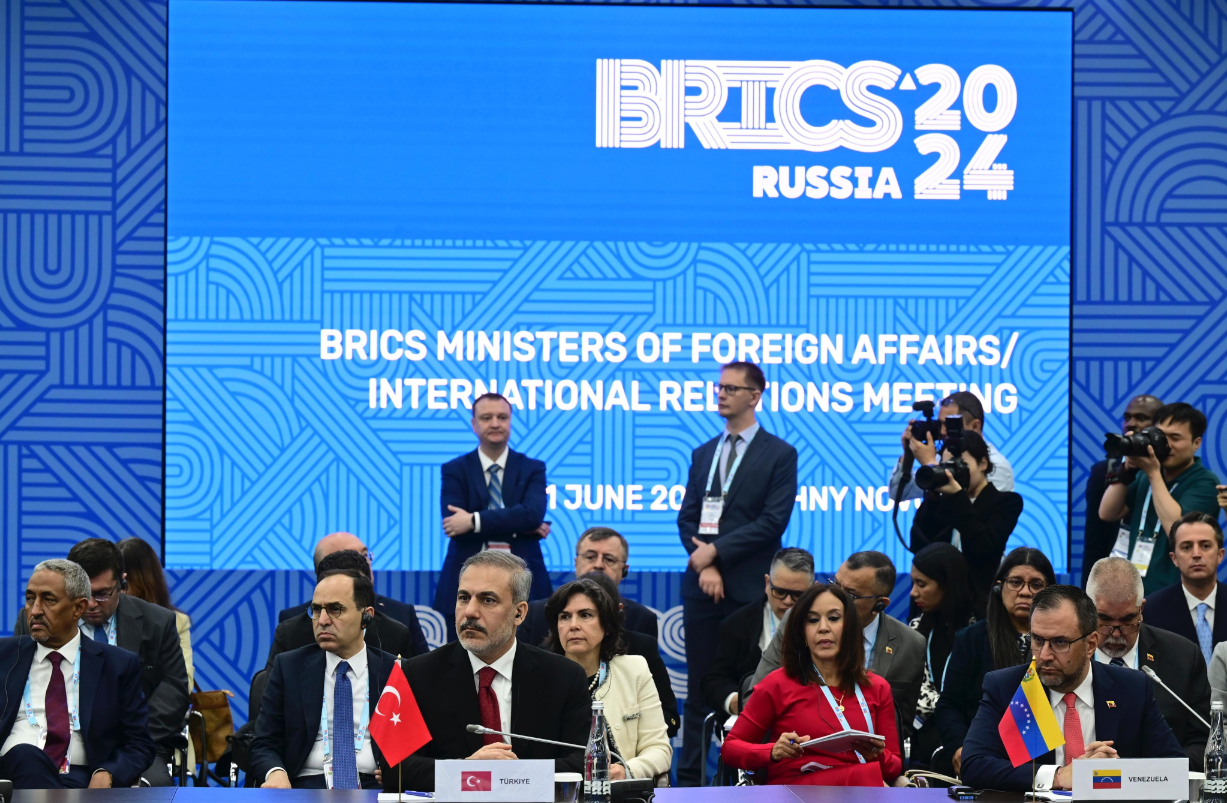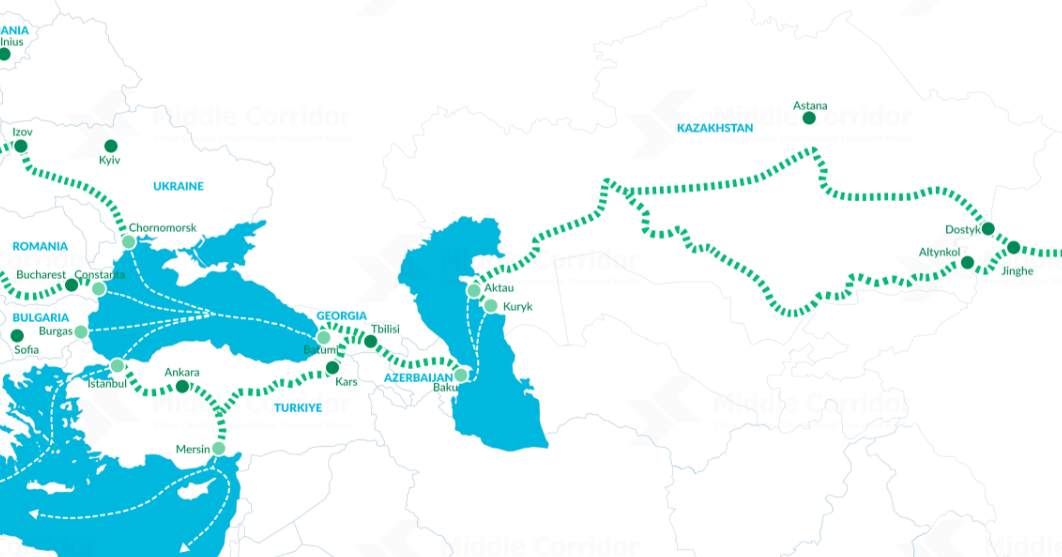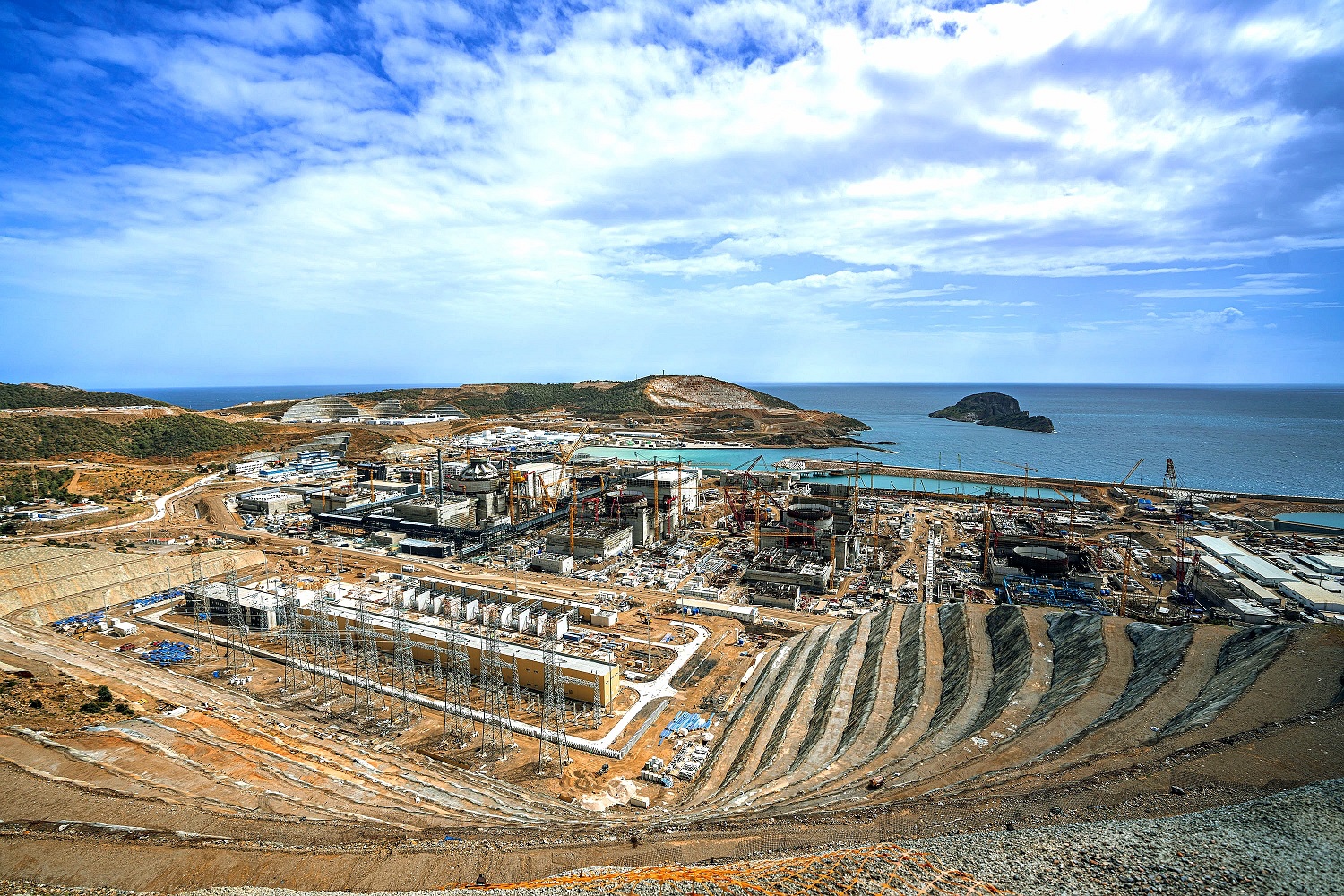
Türkiye Demonstrates Increased Interest in BRICS Membership
Türkiye Demonstrates Increased Interest in BRICS Membership
Executive Summary:
- In June, Turkish Foreign Minister Hakan Fidan met with Russian President Vladimir Putin to discuss, among other issues, Türkiye’s prospective membership in the loose-economic grouping of BRICS, which Putin “fully supports.”
- The impetus for BRICS expansion has grown significantly amid Russia’s full-scale invasion of Ukraine, with Moscow and Beijing promoting it as a critical counterweight to US and Western influence.
- Türkiye’s pursuit of BRICS membership looks to promote foreign investment, increased market access, and economic growth and reflects a foreign policy tradition of balancing between regional powers.
On June 11, Turkish Foreign Minister Hakan Fidan attended a session of the BRICS group (a loose political-economic grouping originally consisting of Brazil, Russia, India, China, and South Africa) in Moscow. While there, he met with Russian President Vladimir Putin, Foreign Minister Sergei Lavrov, and Russian Security Council Secretary Sergei Shoigu (Turkish Foreign Ministry, June 11). During the face-to-face meeting with Putin, Fidan discussed bilateral economic and political relations, focusing on the geopolitical turmoil in the Middle East caused by the war in Gaza (Al-Monitor, June 16). Putin vowed to “fully support” Turkish membership in BRICS and build stronger ties to facilitate further economic cooperation. Fidan’s visit to Russia came shortly after he visited China, where he reiterated Ankara’s willingness to join BRICS and the Shanghai Cooperation Organization (SCO). These pronouncements have raised eyebrows in the West (see EDM, June 24). US Ambassador to Türkiye Jeff Flake declared that Türkiye’s place is “in the West” and voiced his hope that Ankara would decide against joining the bloc. Thus far, Türkiye’s gradual rapprochement with the countries of BRICS and the SCO in recent years has seemingly not jeopardized ties with the West, likely because the country has stopped short of full-fledged membership in either grouping. Ankara’s growing interest in BRICS is significant for Russia, as the bloc seeks to be a viable alternative to the Group of Seven (G7) and other Western-centric international groupings. As such, Turkish membership in BRICS, as well as the SCO, would represent a significant shift in global power dynamics (Middle East Eye, June 8).
Türkiye’s continued cooperation with Western allies can be seen in Ankara and Washington’s contract for the sale of 40 F-16 fighter jets signed on June 13. The Joe Biden administration finally authorized the $23 billion deal following months of negotiations (Al Mayadeen English, June 13). While Russian media reported on the deal, the reports did not include any official Kremlin reactions (TASS, June 13).
Along with Putin, Brazilian President Luiz Ignácio Lula da Silva reiterated his support for Türkiye’s BRICS membership to President Recep Tayyip Erdogan during the most recent G7 summit in Italy (President of Brazil, June 15). The growing partnership with Brazil lies in the strong personal relationship between Erdogan and Lula. In November 2022, Erdogan publicly congratulated Lula on his electoral victory and declared that “cooperation between Türkiye and Brazil … would be a direction-setter in dealing with global challenges” (Hürriyet Daily News, November 1, 2022). This is quite similar to the foundations of Turkish-Russian relations, which rely heavily on close contact between Erdogan and Putin. In May 2023, Erdogan lauded Türkiye’s “special relationship” with Russia in facilitating the success of the Black Sea Grain Initiative (TASS, May 22, 2023).
BRICS members have been quite open about their interest in expanding and becoming an alternative platform to counter Western influence. In August 2023, the United Arab Emirates, Ethiopia, Iran, and Egypt joined the BRICS ranks as full members (Intellinews, June 4). Ankara will likely seek economic benefits from joining BRICS rather than any significant political concessions or benefits. Such a move looks rational in light of the ongoing financial and economic troubles in the Turkish economy. Proponents of Turkish membership in BRICS point out that such a development will likely lead to increased trade, foreign investment, and market access, which could stimulate economic growth (Daily Sabah, June 14). Moreover, unlike the treaties that govern accession to the European Union and North Atlantic Treaty Organization (NATO), membership in BRICS does not require political or economic commitments or agreements. Even so, Turkish officials, in a reflection of Türkiye’s traditional balancing between regional powers, have emphasized that they do not see BRICS as an alternative to NATO or EU membership (Middle East Eye, June 8).
The impetus for BRICS expansion has grown significantly amid Russia’s full-scale invasion of Ukraine. Moscow, Beijing, and other capitals have promoted expanding alternative groupings, such as BRICS, as a counterweight to US and Western influence. Russia and China are keen to consolidate their camps and expand their network of new partners to strengthen their positions in a wider conflict with what they term the “collective West.” As such, Türkiye, with its vast economic potential and strategic location, would serve as a valuable “node” between East and West (Arab News, July 22, 2022).
Fidan’s recent visit to China demonstrated Ankara’s willingness to boost its economic portfolio with non-Western partners. Fidan underlined that “China is Türkiye’s second-largest trading partner with a trade volume approaching $50 billion between the two countries” (Asia Times, June 8). Hence, plans to join BRICS can be interpreted as another factor in Ankara’s pragmatic decision to increase its trade volume with China under more favorable terms (see EDM, June 24).
Despite global ambitions and plans, the political and economic influence of BRICS remains limited, especially considering the sharp differences in member countries’ economic indicators. Some estimates have indicated that China accounts for almost three-fourths of the bloc’s economic weight (Arab News, July 22, 2022). Moscow and Beijing are eyeing more participation of middle powers such as Türkiye to better “balance” the organization and make it a more attractive option for countries seeking to avoid Western dominance and influence.
The geopolitical upheavals brought on by Russia’s war against Ukraine and the war in Gaza have paved the way for the rise of alternative platforms to more Western-centric international groupings. Through BRICS membership, Türkiye aims to boost its unique role within a highly volatile region and provide it with more options in balancing relations between Russia, China, and its Western allies. BRICS’s aims of de-dollarizing trade and using local currencies, however, may prompt some troubles for Ankara, as the lira’s value has declined precipitously and the country’s trade has been traditionally tied to the US dollar (Asia Times, June 8).


